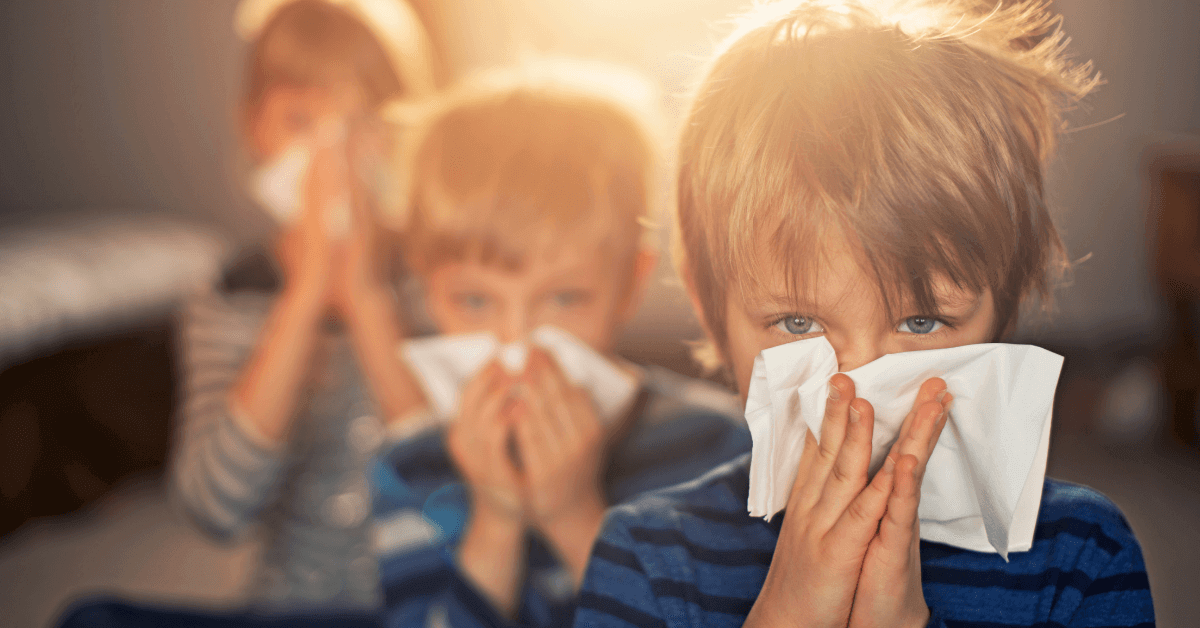7 Supplements Your Child Needs To Reduce Seasonal Allergies
How to Reduce Seasonal Allergies
Let me guess.. your little one has allergies.
Have you ever noticed the dark circles under their eyes?
Skin flare-ups?
Constipation or headaches?
It's worrisome, I know.
Imagine if you could clear up these symptoms with diet and supplements.
I know, I'm not a fan of supplements either, and sometimes they feel like too much!
But the truth is - these supplements fill the nutrient gaps.
Read that again 👆
If our diet, digestion, and gut health were "ideal", we wouldn't need so many supplements.
This means, including herbs into our diet every single day.
But don't forget, we can reverse these allergic symptoms and even "asthma-like" breathing – when we address their gut health and environmental toxins; like mold toxicity. ¹
My son began his life with milk intolerance and as he grew, I noticed he had a gluten intolerance as well. When we addressed his gut health – his symptoms changed.
his energy increased
his skin cleared up
stomach pains went away
the nagging cough stopped
So what can you do about it?
Here's my promise to you. By the end of this post, you'll understand how to reduce your child's allergic response – naturally.
But wait! Always check with your doctor before adding any supplements to your child's diet.
What is an allergy anyway?
When your child's immune system reacts to a foreign substance - like an insect bite, pet dander, or cockroaches, their immune system produces a substance called Immunoglobulin E (IgE) antibodies.
These antibodies travel to cells that release chemicals, causing an allergic reaction or inflammation.
This inflammation can be as little as red, rosy cheeks, or as severe as anaphylaxis - a potentially life-threatening emergency.
Why allergies are bad right now
*While most food allergies cannot be cured, you will see an enormous change in your child's health and symptoms when you address these 7 things:
Your child's gut health - heal their gut with the 4R approach
Reducing inflammation naturally with herbs, diet & supplements
Boosting their immunity with herbs & supplements
Removing any food sensitivities to reduce inflammation*
Promoting healthy digestion and elimination {no more constipation}
Avoid medications and antibiotics - this affects their gut health
Reducing toxins in their environment and food
What are the 6 types of allergies?
Insect sting
Pet dander
Drug
Mold- Don’t dismiss this! <<<
Cockroach droppings- This is the #1 cause of breathing trouble with children in the city
Hay fever
What are the top food allergies in children?
A food allergy produces an increase in IgE and possible anaphylactic shock. **You would NEVER re-introduce these foods into your child's diet if they have a true food allergy to them.
Food Sensitivity is when your child's digestive system is triggered.
An elimination diet is the gold standard way to discover which foods bother your child and may even be causing behavioral problems. But, it will not "fix" the symptoms.>>
A good way to test your child's food sensitivities is with EverlyWell:https://www.everlywell.com/products/food-sensitivity/
By integrating the 4R approach to reduce inflammation, you may notice fewer allergic responses and asthma attacks. If your child has a food sensitivity (not a food allergy!), you could re-introduce the food into their diet again or may keep it out for good.
What are the top food allergens & food sensitivities?
Wheat
Dairy
Eggs
Soy
Crustaceans
Fish
Tree Nuts
Peanuts
Food Allergy Symptoms
Tingling in the mouth
Swelling of the lips, tongue, face, or throat
Hives
Anaphylaxis²
Food Sensitivity Symptoms
behavioral problems (dairy, wheat)
chronic belly aches, gas, bloating
dark circles under their eyes (dairy)
acne on the back of their arms (gluten)
bed-wetting
chronic sinus and ear infections (dairy)
hearing problems (occasionally accidentally diagnosed as ADHD)
headaches
sniffles
swollen lymph nodes & more
colic
chronic cough (gluten)
Hay fever, also called allergic rhinitis, can cause:
Sneezing
Itching of the nose, eyes, or roof of the mouth
Runny, stuffy nose
Watery, red, or swollen eyes (conjunctivitis)
The top 9 foods to add to your child's diet to reduce inflammation include:
green leafy vegetables
organic purple fruits
fiber
probiotics
Tumeric
B vitamins: eggs, poultry, and lentils
Chlorella: sea vegetables
Culinary herbs to support detox: garlic and onion
Quercetin: Cherries, strawberries, and broccoli
7 Supplements To Reduce The Allergic Response
>>Pro tip: Keep in mind, that when kids are young and cannot swallow pills - you'll want to open the capsules and pour the powder into a juice or smoothie and stir well.
You're making a sort of "concoction" for them.
Try one herb at a time, to see if there are any adverse reactions, then add a second botanical.
Little DaVinci products and Herb Pharm for kids are great choices for young children.
#1 Freeze-Dried Stinging Nettles
Better than Claritin!
Stinging nettles, are a prickly green herb you'll find outside on the outskirts of your yard in the summertime.
They have a mean bite, but this bite, these hairs are known as a natural antihistamine – helping to reduce allergies naturally.
And the sting? That goes away when the greens are cooked or dried.
For children 4 or older: you can break open one of the freeze-dried stinging nettle capsules and add it to a shake or drink.
We like Planetary herbals freeze-dried stinging nettles- see them within the Fullscript store below!
Pro tip: Open the capsule for young children who cannot swallow the pills
“IMPORTANT: When you purchase nettles, it has to be the “freeze-dried” version because this is where the antihistamine is located - with the sting!”
#2 Quercetin
Quercetin is a plant pigment (flavonoid). It is found in many plants and foods, such as red wine, onions, green tea, apples, berries, Ginkgo biloba, St. John's wort, American elder, and others.
Quercetin has been shown to reduce inflammation and inhibit histamine release; reducing allergic response. ³
Add quercetin foods or supplements to your diet to reduce inflammation.
Pro tip: Look for liquid quercetin supplements if your child cannot swallow pills.
#3 Curcumin
Curcumin was reported to have an anti-allergic property with an inhibitory effect on histamine release from the mast cells. Naturally found in Turmeric, you can add this orange spice to your little one's hot chocolate or orange juice or add a supplement.
“So there is a gut-allergy connection when you struggle with seasonal allergies. By “healing your gut”, you can reduce these symptoms. ”
#4 Digestive Enzyme
Digestive enzymes help break down protease, amylase, and lipase – aiding digestion and breaking down proteins, a common irritant.
In this post by Enzymedica they explain how digestive enzymes can help reduce the allergic response.
My son loves kids digest by Enzymedica digestive enzymes.
#5 Probiotics
Probiotics can help heal the gut, which can be the source of many inflammatory diseases – including allergies.
Look for ones with Lactobacillus and Bifidobacterium species for healthy immunity.
My clients and I have noticed quality matters when purchasing a probiotic. Klaire Probiotics is a company I love.
“See all my favorite supplements when you log into Fullscript and search >catalog>allergies”
#6 Butterbur
Butterbur is known to reduce migraines and seasonal allergies.
When purchasing Butterbur, choose one that is PA-free.
Little DaVinci use to have a liquid formula and no longer does.
# 7 Grapefruit Seed Extract- Xlear
Nasal rinses have been used for years to clean out the pollen in your nasal passages.
As the neti pot is challenging for little kids, Xlear has worked well for us.
This is a great alternative to any nasal sprays your doctor has suggested.
Xlear uses grapefruit seed extract, which is also known as a natural antibacterial to treat and prevent infections.
Conclusion:
When your child is struggling with allergies, you'll want to address their gut health. Often, they're not eating enough vitamins and minerals, or they're consuming a food that they are sensitive to; causing an inflammatory response like dairy or gluten.
And, of course - they are the top two foods kids love!
By reducing inflammation and the inflammatory response, you can reduce the seasonal allergy symptoms your child is experiencing and boost their health for years to come.
Need more help? Book a health consultation with me today.
xo Tara
P.S.
Additionally, if you live in mold or have been exposed to it- you need to remove this toxicity from your body. The first step is to get an air filter for your bedroom (or your child’s) to clear the air. I LOVE>>>> Air Doctor.
*Remember, you would never re-introduce a true food allergy to your child's diet.
References:
¹https://www.ncbi.nlm.nih.gov/pmc/articles/PMC6056614/
²https://www.mayoclinic.org/diseases-conditions/allergies/symptoms-causes/syc-20351497
³https://www.ncbi.nlm.nih.gov/pubmed/27187333
https://www.ncbi.nlm.nih.gov/pubmed/18398870
https://enzymedica.com/blogs/get-better/natural-remedies-for-spring-allergies
https://www.medicalnewstoday.com/articles/323276.php
Probiotics & Allergic Rhinitis https://www.ncbi.nlm.nih.gov/pubmed/25899251

